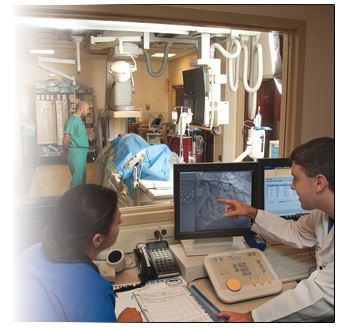Angioplasty
Minimally Invasive Cardiac Procedures
 Atherosclerosis describes blood vessels that have been narrowed by artery
plaque. The harder it is for blood to flow, the more likely it is you
could suffer a cardiac event such as a heart attack or stroke. Unfortunately,
atherosclerosis usually does not present any symptoms until a cardiac
event occurs. Many people are unaware they have atherosclerosis until
it is too late. The good news that it is possible to diagnose atherosclerosis
before the cardiac event occurs.
Atherosclerosis describes blood vessels that have been narrowed by artery
plaque. The harder it is for blood to flow, the more likely it is you
could suffer a cardiac event such as a heart attack or stroke. Unfortunately,
atherosclerosis usually does not present any symptoms until a cardiac
event occurs. Many people are unaware they have atherosclerosis until
it is too late. The good news that it is possible to diagnose atherosclerosis
before the cardiac event occurs.
Whether you have already had a heart attack or your doctor thinks you might be at high risk for one, steps need to be taken to get the blood flowing freely through your veins again. A common, minimally invasive treatment for atherosclerosis is angioplasty.
What is Angioplasty?
In this procedure, a small incision is made near the blocked artery. A catheter with a small balloon attached is then guided through the artery to the blockage. Once in place, the balloon is inflated to push back plaque and widen the artery. Once this is done, angioplasty is usually followed with stenting, wherein a small, mesh tube is placed into the widened artery to keep blood flowing.
Though angioplasty is highly successful and provides immediate benefits, this alone is not enough to stop artery plaque from developing. Many patients will need to follow up with cardiac rehabilitation to maintain the benefits and reduce plaque buildup in other parts of the body.
In addition to angioplasty, your doctor may recommend the following to treat angioplasty:
- Medication
- Exercise
- Stress management
- Diet changes
- Stop smoking (if applicable)
Why Choose MSLC?
Montefiore St. Luke’s Cornwall was among the first in the region to offer emergency and elective angioplasty. Our cardiologists are experienced in both standard and peripheral angioplasty—when the procedure is used to treat arteries in the lower abdomen, kidneys, arms, legs, or feet. In addition to angioplasty, we can also perform cardiac hypothermia for patients in danger of losing brain functions during cardiac arrest.
When a cardiac event poses a danger to you or someone you love, the dedicated cardiologists at MSLC are ready to provide the personalized care and attention you need.

 Pay My Bill
Pay My Bill
 Contact Us
Contact Us
 Patient Portal
Patient Portal
 Donate
Donate